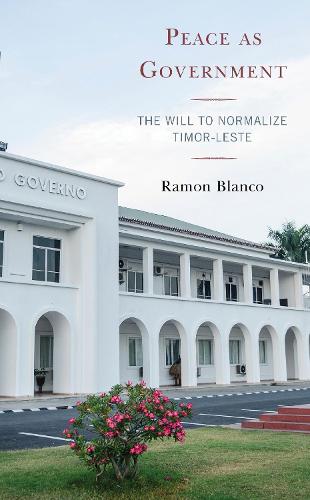
Peace as Government: The Will to Normalize Timor-Leste
(Hardback)
Available Formats
Publishing Details
Peace as Government: The Will to Normalize Timor-Leste
By (Author) Ramon Blanco
Bloomsbury Publishing PLC
Lexington Books
28th February 2020
United States
Classifications
Professional and Scholarly
Non Fiction
Peace studies and conflict resolution
327.172
Physical Properties
Hardback
246
Width 160mm, Height 230mm, Spine 24mm
540g
Description
Peace as Government: The Will to Normalize Timor-Leste brings a problematization of post-conflict reconstruction processes by bridging two theoretical approaches that are often placed in diametrical opposite epistemic poles the analytical tools developed by Michel Foucault and the English School. The author argues that peace operations have a very precise function in the international scenario the fostering and the maintenance of a (neo)liberal order in the international society. He evinces that this particular function of peace operations is developed through the will to normalize post-conflict states and their populations. In order to advance his argument, the author analyses the United Nations (UN) engagement with Timor-Leste, since no other country had the large number of peace operations, the wide range of spheres of engagement or the depth of involvement that the UN had in Timor-Leste. The author evinces that this will to normalize Timor-Leste is rendered operational though the mechanism of government, the conduct of conducts in a Foucauldian sense, functioning in two levels. At the international level, the government operates through discipline, rewarding and punishing the Timorese state seeking to shape its behaviors as an individual in the international society. At the national level, the government operates through biopolitics, which functions through the attempt of shaping the life-supporting processes of the Timorese population.
Reviews
The UN's five consecutive massive (and intrusive) state-building and peace-building missions in postconflict Timor-Leste (1999-2012), labeled by some as "neotrusteeship," are generally regarded as having been a qualified success. Drawing on theories and concepts earlier elaborated by Michel Foucault and the English school of international relations, Blanco (Federal Univ. of Latin-American Integration, Foz do Iguau, Brazil) has created a novel analytical synthesis to explain those UN operations as a Foucaultian dispositif. In short, the totality of the UN's efforts to administer, discipline, and "normalize" life and governance in Timor-Leste constituted a comprehensive surveillance framework designed to transform this fledgling, collapsed postcolonial polity into a functioning liberal democratic state. Blanco's critical appraisal, based on fieldwork, UN documentation, and relevant secondary sources, lays bare the inherent limitations of even such ambitious undertakings. It offers a different perspective on international relations theory generally, and enriches our understanding of prevailing concepts such as statehood, power, international society, peace, global governance, and multilateral peace operations. . . this book should be found in all college and larger public libraries, especially those with collections specializing in international affairs. Summing Up: Highly recommended. Upper-division undergraduates. Graduate students, faculty, and professionals.
-- "Choice Reviews"Author Bio
Ramon Blanco is professor at the Federal University of Latin-American Integration.
